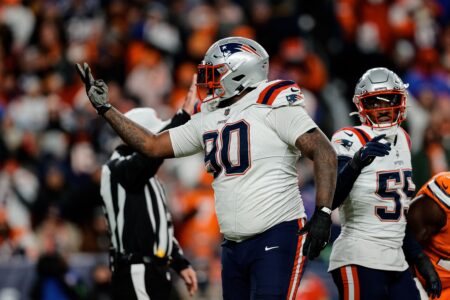- Joined
- Oct 20, 2007
- Messages
- 29,794
- Reaction score
- 20,459
Registered Members experience this forum ad and noise-free.
CLICK HERE to Register for a free account and login for a smoother ad-free experience. It's easy, and only takes a few moments.Something to keep in mind: TFB has never lost in OT, except when he hasn't had a chance at a possession.
As far as the stats, there were 400 rushing TD's and 745 receiving TD's in the NFL last year, in addition to 19 PR's, 9 KR's, 48 INT returns, and 31 fumble returns. So that's 1154 offensive touchdowns, 19 touchdowns scored on special teams, and 79 defensive touchdowns.
If you assume that each team in a game gets about 10 series a game, then that's about 5120 total series in a season. Make it 5000 to make the math easier. You have about a 23% chance of scoring a TD on an offensive possession.
On the other hand there were 838 FG's and 21 safeties. So, in the regular season you'd have about a 17% chance of kicking a field goal, so about a 40% chance total of a score that would win the game, and about a 2.5% chance that a mistake will end the game by the other team scoring.
In the playoffs, the other team's scoring to win remains the same, but your chance of winning on offense on the first position goes down to the 23% of scoring a TD. Note that these are on average. NE, GB, and NO, for instance, probably converted about 35-40% of their drives into TD's, while GRONK had a better conversion rate than a team like the Rams.
The Broncos scored 31 TD's this season via the pass or rush; the Steelers 34. So it's about a wash on that front.
With the way the new Rules are in Overtime, they did.
Everyone elects to take the ball first, because they are hoping that they can drive 40 yards to kick a field goal, most teams can't drive 80 yards for a touchdown.
With the new rules, the smartest play would have been to kick off, and play defense, as overtime now becomes a field position game to whomever can get the TD.
The Assumption is that you can stop a team from scoring a TD, if you feel you can't you shouldn't be in OT anyways.... and you deserve to lose.
But if you can hold them to a punt, there is a greater chance your field position is going to be better than a kick off, and therefore a greater chance for scoring a game winning TD.
The Assumption is that you can stop a team from scoring a TD, if you feel you can't you shouldn't be in OT anyways.... and you deserve to lose.
this is a lazy argument. and that 80 yard td play proved it. sometimes teams get lucky... this is the nfl, anything can happen at any time. just because the other team can score a td on you doesn't mean you "deserve" to lose since the other team can likely do the same to youWith the way the new Rules are in Overtime, they did.
Everyone elects to take the ball first, because they are hoping that they can drive 40 yards to kick a field goal, most teams can't drive 80 yards for a touchdown.
With the new rules, the smartest play would have been to kick off, and play defense, as overtime now becomes a field position game to whomever can get the TD.
The Assumption is that you can stop a team from scoring a TD, if you feel you can't you shouldn't be in OT anyways.... and you deserve to lose.
But if you can hold them to a punt, there is a greater chance your field position is going to be better than a kick off, and therefore a greater chance for scoring a game winning TD.
To paraphrase: if you can somehow see into the future and you know with 100% certainty that the kickoff will be a touchback and then you'll hold the opposing offense to a three-and-out, then you will have benefited from electing to kick.
Also, where you say:
I would flip that around and say that "if you can't go down the field and score a touchdown on a worn down, beat up defense that has already played four quarters of football, then you're most likely going to lose anyways. By electing to receive, you're simply taking the first crack at it so that you win in the likely event that both offenses would have scored".
You can only evaluate a decision as good or bad when it is made.They won the game so how could it be a mistake.
The Denver TD was sort of a fluke play.
Where the hell was Polamua? A TD is the fatal blow - game over. With a FG, at least youve got a shot at tieing things up.
The NE Safeties will be protecting the big play from happening I can guarantee you that.
You can only evaluate a decision as good or bad when it is made.
Whether a decision works out or not is an entirely different issue.
I know a number of posters to this board understand that because they have said it. I know a number of posters never will understand it.














